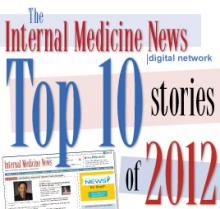While it may lack the gap-toothed grin and wry comedic edge of The Late Show With David Letterman's Top 10 lists, the Internal Medicine News list of our top 10 most popular stories of 2012 delivers plenty of audience-pleasing clinical value.
And so, without further ado or musical accompaniment by Paul Schaffer, direct from the home office in Rockville, Md., here's the Internal Medicine News 2012 Top 10 countdown:
10. Memory Changes, Hyperglycemia Prompt Statin Label Changes. Physicians can anticipate three key safety changes to the labels of several cholesterol-lowering drugs, according to a Food and Drug Administration announcement.
9. HPV Vaccine's Benefits Are Mainly Extracervical. The human papillomavirus vaccine is still widely perceived as a tool aimed at preventing cervical cancer, yet in fact roughly 55% of all the cancers it should protect against occur at other sites.
8. Alternative Statin Regimens Reduce Muscle Pain. Alternative dosing regimens solve the common problem of statin-induced muscle pain in most cases. Lowering the daily dose of the statin, dropping down to alternate-day or even once-weekly therapy, or switching to another statin having a better track record with regard to myalgia all have been shown to improve tolerability while maintaining reasonably effective lipid-lowering.
7. Aspirin for Primary Prevention: What Should We Tell Patients? There’s little controversy surrounding the use of aspirin for the prevention of cardiovascular events in patients with established disease. By contrast, there’s far more smoke than light regarding the issue of aspirin for primary prevention.
6. AACE Endorses Lower LDL Targets, ApoB Testing. New guidelines on dyslipidemia and the prevention of atherogenesis give official sanction to something endocrinologists have been doing for years: lowering LDL targets to below 70 mg/dL for all very high-risk patients.
5. Vitamin D Deficiency: Prevention, Evaluation, Replacement. Issues around screening and treatment of vitamin D deficiency have been very controversial in recent years. The Endocrine Society recently published an evidence-based guideline aimed at helping determine who should be screened and receive vitamin D replacement.
4. Justices Hint at Striking Entire Affordable Care Act. The Affordable Care Act’s future was thrown further into doubt on March 28 as the Supreme Court concluded its 3 days of oral arguments. In the morning, a potential majority of the justices seemed to be leaning toward the idea that if they found the so-called individual mandate to be unconstitutional, they might strike down the entire law.
3. Uncontrolled Hypertension Deemed Pervasive in U.S. Adults. More than half of American adults with hypertension in the United States do not have their blood pressure under control, including many of those being treated for the condition, according to the Centers for Disease Control and Prevention.
2. Vedolizumab Scores on Safety, Efficacy for Ulcerative Coliltis. Vedolizumab, a novel drug that selectively blocks lymphocyte trafficking to the gut, was safe and highly effective for inducing and maintaining clinical remission in patients with moderate to severe ulcerative colitis in a pivotal phase III trial.
1. Lyme Disease Presents Differently in Men and Women. Women with Lyme disease display more clinical symptoms than do men with the disease and also are less likely to seroconvert following treatment, according to findings from a prospective cohort study involving 77 patients.

